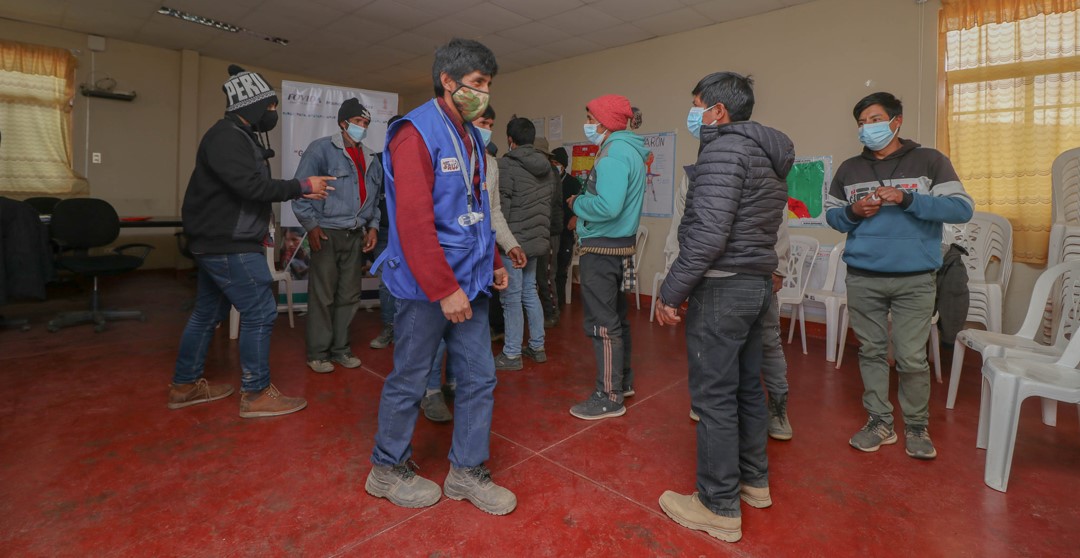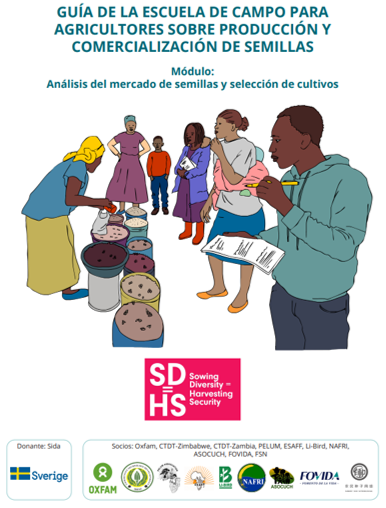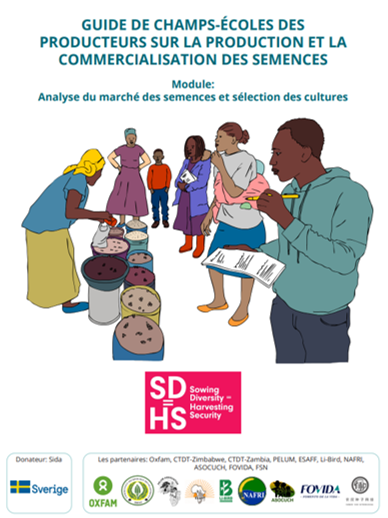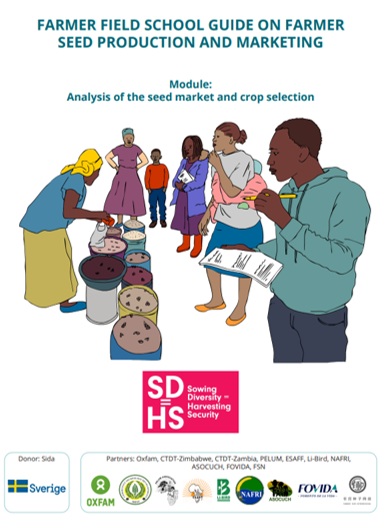Angel Villavicencio Durán& Saúl Povez (FOVIDA), Ana Lucía Núñez & Carolina Oviedo (Oxfam Peru)
Within the framework of the SD=HD project, executed by FOVIDA and financed by Oxfam, workshops on New Masculinities are being held with the participation of local authorities and producers from the districts of Acostambo and Ñahuinpuquio (Tayacaja), Paucará and Rosario (Acobamba) in Huancavelica and Masma Chicche (Jauja) in Junín.
The aim was to encourage men to reflect on the structures of hegemonic masculinity that predominate in society and are replicated in their territories. At the same time, the implications of these structures in the inequalities between men and women in the family, social, cultural and economic dimensions are highlighted. To date, 59 men have participated.
With the facilitation of a specialist in New Masculinities and the use of audiovisual tools, participants identified and analyzed, based on their experiences and feelings, the roles associated with men and women as well as the mandates and processes of learning and socialization of their masculinity. They also discussed their limitations in expressing feelings and emotions, especially those culturally socialized to women, such as tenderness, pain, uncertainty and insecurity; and they reflected on the mandates related to the exercise of their sexuality and violent aspects as a mechanism for expressing learned superiority and hierarchization.
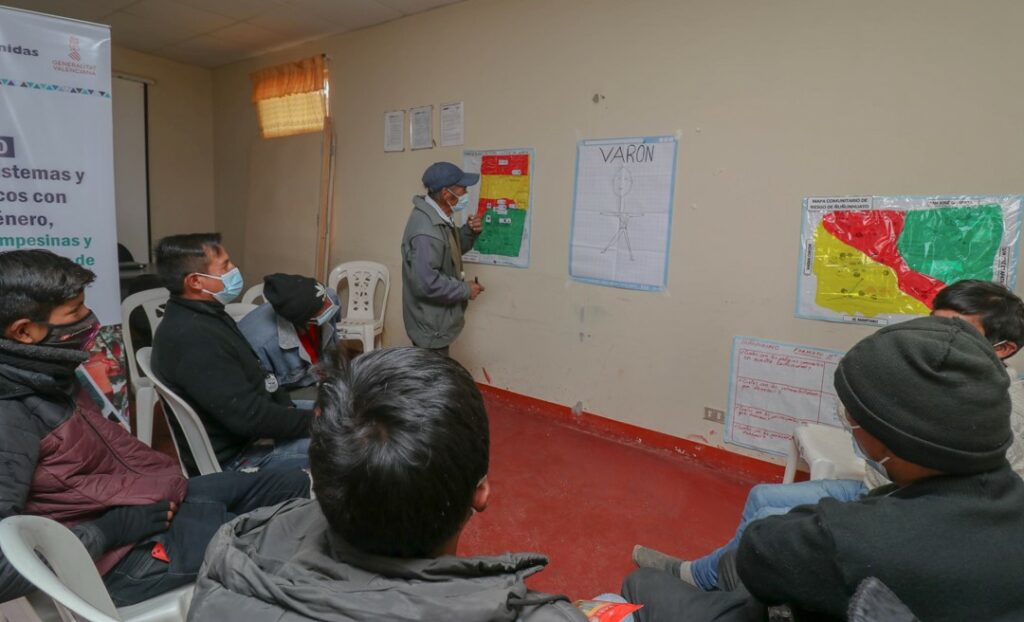
As a result, they identified and analyzed how these mechanisms influence their coexistence with their partners and the formation and development of their sons and daughters. They reflected on experiences of violence lived in their homes during their childhood, the physical and psychological violence they exert towards their partners, the effects on their children’s behavior and on the reproduction and reinforcement of violent and disciplining patterns. At the same time, they recognized that, in most of their families, dialogue between couples is not very common, and that it is generally the man – the husband – who decides to resolve family problems unilaterally, which reinforces violence and accentuates unequal power relations based on gender.
Although we cannot yet speak of an impact as such, there have been small changes, which can be seen in the expressions of the male participants with respect to their female peers:
“…I am going to improve my relationship with my wife and children”
“I want my children not to experience what I experienced when I was younger”.
As well as in favorable attitudes and commitments to assume responsibilities arising from domestic and care work. Among their expressions, the following stand out:
“I am going to pass on today’s knowledge to my family and friends”
“… from now on I am going to show more affection to my children.”
“We must help within the community and not allow women and children to be mistreated”
“Using communication with our wives and children, since they learn and that is what they will do when they form their own families”.

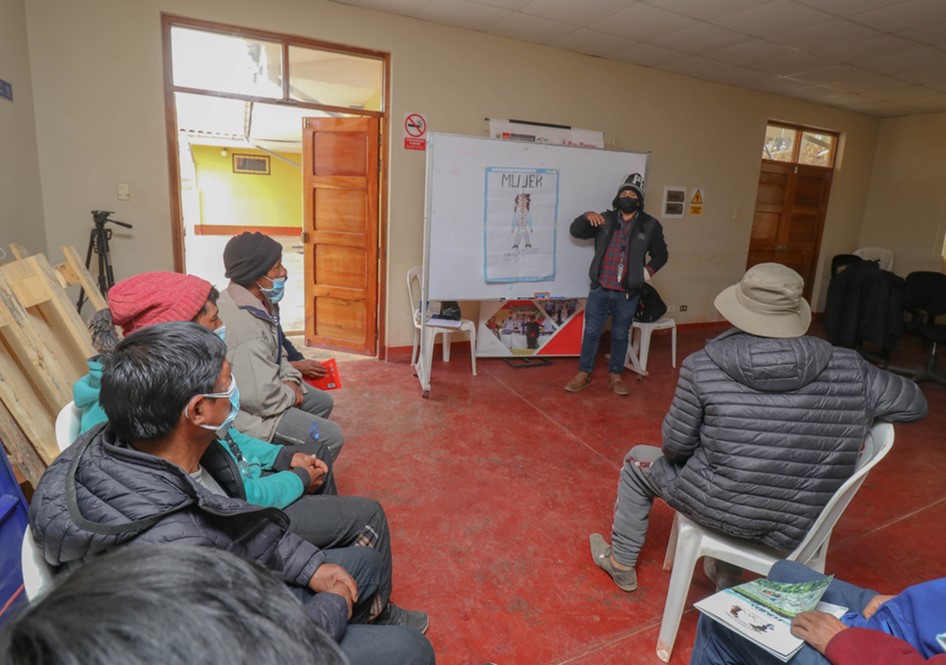
The participants find the workshops very helpful because they find different ways to resolve their conflicts: through dialogue, learning to listen and expressing feelings and thoughts. In addition, some of them are becoming more involved in the care work at home, such as the children’s school activities, family lunch time, taking an interest in domestic problems, trying to relate better with their partner and improving their relationship with each other. However, they say that it is difficult to change from one day to the next the patterns learned since childhood, but they indicate that change is necessary, prioritizing their use of time to strengthen the bond with their partners and children.

Therefore, it is observed that at the end of the workshops, the participants have committed themselves to change and build new patterns of life based on respect for the other person. In addition, they assumed that violence prevention is based both on the practice of what they have learned in the family and in the community and on sharing the topics in their community, family and organization.
From FOVIDA we reaffirm the importance of continuing to work on the issue of masculinities as a way to contribute to more egalitarian relations between women and men in the areas of intervention. This implies reflecting on their life experiences and deconstructing themselves from learning that contributes to new forms of democratic and non-violent masculinities. In this sense, we believe that in the future, the masculinities workshops will generate conditions to build couple relationships and childhoods free of violence, democratic families and new forms of coexistence in community where women’s rights are vindicated in pursuit of valorization and equitable distributions in care work for equality.
Construyendo nuevas masculinidades desde los Andes Peruanos
Angel Villavicencio Durán& Saúl Povez (FOVIDA), Ana Lucía Núñez & Carolina Oviedo (Oxfam Peru)
En el marco del proyecto SD=HD, ejecutado por FOVIDA y financiado por OXFAM, se vienen realizando talleres sobre Nuevas Masculinidades con participación de autoridades locales y productores de los distritos de Acostambo y Ñahuinpuquio (Tayacaja), Paucará y Rosario (Acobamba) en Huancavelica y Masma Chicche(Jauja) en Junín. Con la finalidad de que los hombres reflexionen sobre las estructuras demasculinidad hegemónica que predomina en la sociedad y se replica en sus territorios. A su vez, que se evidencien las implicancias de esas estructuras en las desigualdades entre hombres y mujeres en las dimensiones: familiar, social, cultural y económica. A la fecha han participado 59 hombres.
Con la facilitación de un especialista en Nuevas Masculinidades y el uso de herramientas audiovisuales, los participantes identificaron y analizaron, a partir de sus vivencias y sentires, tanto los roles asociados a hombres y mujeres como los mandatos y procesos de aprendizaje y socialización de su masculinidad. Además, dialogaron sobre sus limitaciones para expresar sentimientos y emociones, especialmente aquellas socializadas culturalmente a las mujeres como la ternura, dolor, incertidumbre e inseguridad; y reflexionaron sobre los mandatos relacionados con el ejercicio de su sexualidad y los aspectos violentos como mecanismo de expresión de una superioridad y jerarquización aprendida.

A raíz de esto, identificaron y analizaron como esos mecanismos influyen en la convivencia con sus parejas y en la formación y desarrollo de sus hijos e hijas. Reflexionaron sobre experiencias de violencia vividas en sus hogares durante sus infancias, la violencia física y psicológica que ellos ejercen hacia sus parejas, los efectos en la conducta de sus hijos y en la reproducción y fortalecimiento de patrones violentos y disciplinadores. A su vez, reconocieron que, en la mayoría de sus familias, el diálogo entre parejas es poco común, siendo generalmente el hombre -el esposo- quien decide resolver los problemas de la familia de forma unilateral. Esto refuerza la violencia y acentúa las relaciones desiguales de poder por motivos de género.
Si bien no podemos hablar aún de un impacto propiamente dicho se han dado pequeños cambios, los que se aprecian en las expresiones de los hombres participantes respecto a sus pares mujeres:
“…voy a mejorar la relación con mi esposa y mis hijos”
“Quiero que mis hijos no vivan lo que yo viví cuando era más chico”.
Como también en actitudes favorables y compromisos de asumir responsabilidades que surgen de las labores domésticas y de cuidados. Destacan entre sus expresiones:
“Voy a llevarlos los conocimientos de hoy a mi familia y amigos”
“… de aquí en adelante voy a demostrar más afecto a mis hijos.”
“Hay que ayudar dentro de la comunidad y no permitir que se maltrate ni a las mujeres ni a los niños”
“Usar la comunicación con nuestras esposas, e hijos, puesto que ellos aprenden y es lo que harán cuando formen sus propias familias”.


Los participantes consideran que los talleres son de gran ayuda porque encuentran formas distintas de resolver sus conflictos: dialogando, aprendiendo a escuchar y expresando sentimientos y pensamientos. Además, algunos se están involucrando más en las labores de cuidados en el hogar como en las actividades escolares de los hijos, el tiempo de almuerzo en familia, interesándose en los problemas domésticos, tratando de relacionarse mejor con su pareja y mejorando su trato. Sin embargo, refieren que es difícil cambiar de un día para otro los patrones aprehendidos desde las infancias, pero indican que es necesario el cambio, priorizando su uso de tiempo para fortalecer el vínculo con sus parejas e hijos

Por lo tanto, se observa que al culminar los talleres los participantes se han comprometido con el cambio y la construcción de nuevos patrones de vida, basados en el respeto hacia la otra persona. Además, asumieron que la prevención de la violencia se basa tanto en la práctica de lo aprendido en la familia y en la comunidad como al compartir los temas en su comunidad, familia y organización.
Desde FOVIDA nos reafirmamos en la importancia de seguir trabajando el tema de masculinidades como forma de contribuir a relaciones más igualitarias entre mujeres y hombres en los ámbitos de intervención. Esto implica reflexionar desde sus experiencias de vida y deconstruirse desde aprendizajes que aporten a las nuevas formas de masculinidades, democráticas y no violentas. En ese sentido, consideramos que de cara al futuro los talleres de masculinidades generarán condiciones para construir relaciones de pareja e infancias libres de violencias, familias democráticas y nuevas formas de convivencia en comunidad donde se reivindiquen los derechos de las mujeres en pos de valorización y distribuciones equitativas en los trabajos de cuidados para la igualdad.

